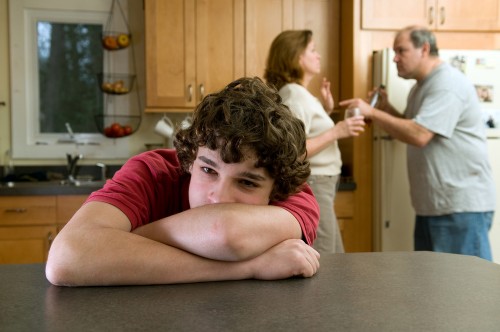Just A Part Time Kid – Divorce Part 2
[I wrote this article some time ago. Re-reading it now, it seems just a bit “preachy” to me, but still very true. Read it anyway. You can handle it – and it’ll be good for you!)]
A divorce is difficult, not only on the parents but also on the children. Last week I described some of the issues children have with the loss of a parent and said I would give some "rules for divorce" this week.
Several studies have shown that there is a tendency for parents going thorough divorce to not realize the increase in the child’s stress-related behaviors which is clearly evident to the child’s school teacher.
Each parent may have a fervent wish to spend as much time as possible with the child and no encroachments from the other side are appreciated.
The parent not with the child at the moment might have worries and suspicions that the "ex" isn’t playing fair: too much indulgence, too much relaxation of the rules, maybe a little undermining of the custodial parent’s authority or even a little character assassination.
Parenting Rules In Divorce
There are some parenting rules which, if followed, will make it easier for the kids – and the parents — to help the children who are struggling.
- Do not malign! Realize that the child is 50% the other parent and that you cannot degrade or malign your "ex" without hurting your child’s self-esteem.
The child should not be placed in the middle of power struggles, even unconsciously. A chld does not easily switch loyalties when the final decree is signed. -
Don’t downgrade. Realize it’s easy to downgrade the other parent, and try never to do so, even if you feel you have a good cause.
For example, phrases such as "These are the same clothes you left in," "You look like you haven’t slept a wink," "What kind of junk food did they feed you?" and "Didn’t you get a bath the whole weekend?" in reality attack not only the other parent but also the child and make him feel defensive. -
Establish lines of communication so that when you do have a problem with what the other is doing, you can clarify the issues. Not only with the "ex" but also with grandparents, aunts, uncles, and any other "significant other" in your child’s life. They will all be concerned (even though you may not want them to be).
See if you can reach agreement on such items as money spent on the child, bedtime rules, diet and gifts.
Showing some positive regard for the other, where the child can see it, helps build the child’s own self-image. You may need to "act it out" at first. -
Communicate the new rules and feelings to grandparents and the "significant others" mentioned who might otherwise become angry roadblocks to raising the children. Usually the child isn’t taken away from all the people in his life, and so extra effort for communication should be made with them.
Even communicate these "rules" because they are concepts that all of them should follow but, for them, may not be intuitively obvious. - Give the other the benefit of the doubt (a lot) and restrain yourself from leaping to hasty conclusions. Person-to-person communication is the best way to solve misunderstanding.
Remember, children are not always the best communicators and may even manipulate situations. Don’t use the child to "carry messages." - Flee the revenge and other similar motives. Although your ‘ex’ may now be the world’s worst person, they probably do have some good qualities; after all, you did decide to marry them once.
Allowing anger, resentment, or a desire for revenge to continue to burden you not only hurts but will ultimately cripple both you and your children.
These ultimately turn you into the type of person not even your children want to be around. - Don’t preach despair. Grief, anger, and depression are all emotions which are normal following a separation; that is, unless they become permanent personality habits.
Don’t even subconsciously preach despair to your children by telling them "don’t grow up, kids, because there’s nothing but thorns and cactuses up here with us adults."
Pick up the fragments, put them together the best you can, and move on. Old friends may still be there, or new ones. Going back to school and doing volunteer work are good and can show children that life is moving on. - Identify and agree on goals. Both parents, although separated, should have basically the same goal, namely: the ultimate well-being and growth of the child.
- List these "rules" conspicuously and re-read them over and over — because they’re not always easy to keep, especially in times of stress. But they are ALWAYS WORTH IT.
As I mentioned in previous articles, children do not have the ability neurologically to do abstract thinking until they are around 19 -21 years old. It’s just normal development, so they can’t always "see through" peoples motives and alternative possibilities.
However, they do when they get older and it is then when major changes in the child’s attachments may occur as they realize what has happened and the roles people have played.
Undermining the regard or love that your child has for the other parent will most definitely do harm to the child.
And, without a doubt, in the end all of the things which lower the child’s self-esteem come "home to roost" back on parents; because, kids who feel badly about themselves do bad things. Both parents want to make the child feel good about himself and succeed in life.
2 Posts in Divorce for Children (divorce) Series
- Part 2 - Part Time Kid – 17 Dec 2011
- Part 1 - Part Time Kid – 17 Dec 2011


